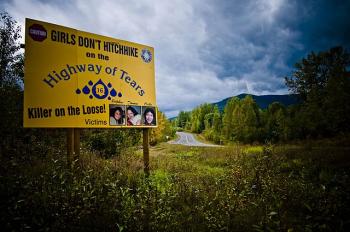In late September, Inuit artist Annie Pootoogook died tragically in Ottawa. Pootoogook was an award-winning illustrator from Cape Dorset, Nunavut. Her ink-and-crayon depictions of everyday life in the north -- families sitting to eat a meal of seal meat or shopping at the Arctic co-op -- received international acclaim. In contrast to the idealized vision many Canadians have of the north, of majestic rock and ice landscapes or charismatic wildlife like polar bears, Pootoogook's drawings often reflected the crushing poverty northern families face and its devastating impacts on their health and well-being.
Ottawa police believe Pootoogook's death is suspicious -- she may have been the victim of foul play. If so, Annie Pootoogook is yet another Indigenous woman to die violently in Canada.
Indigenous women and girls are at least three times more likely to experience violence than non-Indigenous women and six times more likely to be murdered. On any given day, thousands of First Nations, Inuit and Métis women and children are living in emergency shelters to escape abuse (though on-reserve shelters remain woefully underfunded).
The RCMP hasn't kept accurate statistics on the number of murdered or missing people, but Indigenous women's organizations and affected families have reported hundreds of cases of loved ones who have been victims of violent crime. After years of indifference and inaction, Canada’s government has finally launched an inquiry into the many lives lost to violence.
Although the national inquiry into murdered and missing Indigenous women won't investigate cases police previously examined, it will look at broader factors that put Indigenous women and girls at such great risk. According to the UN Committee on the Elimination of Discrimination Against Women, this includes institutional racism, social and economic marginalization and inadequate access to affordable housing so women can escape abusive relationships. Police forces have often failed to deal with violence against Indigenous peoples, and officers themselves have been implicated or charged with assaults and sexual abuse.
Human-rights organizations such as Amnesty International and Kairos have also drawn attention to resource development in Indigenous territories, where the influx of transient workers -- along with money, alcohol and drugs from outside the community -- puts Indigenous women at risk of aggressive harassment and violence by men. As environmentalists, we often emphasize the impacts of mining or oil and gas development on wildlife and ecosystems but ignore the staggering social consequences for Indigenous communities, especially women. Amnesty International's research on the social impacts of resource development in northeast B.C.'s booming Peace Region has uncovered numerous accounts of attacks on women and girls, including "domestic violence, encounters with strangers that ranged from aggressive harassment to brutal violence, including unsolicited offers of drugs and money for sex, sexual assault and gang rapes."
These stories are heart-breaking, but the response from Indigenous peoples brings hope. One such grassroots effort is the Moose Hide Campaign, a growing movement of Aboriginal and non-Aboriginal men dedicated to ending violence against women and children, through education and peer support, encouraging men to develop healthier relationships with the women in their lives.
The Moose Hide Campaign was created by a young First Nations girl named Raven Lacerte and her father, Paul, in British Columbia. Working with First Nations hunters, they have distributed more than 250,000 small moosehide squares to communities across Canada -- encouraging men to wear the pins as symbols of their commitment to be accountable for their behaviour and to reject violence. What makes the campaign particularly poignant is that Raven and her father made the first pins from the hide of a moose they harvested near the infamous Highway of Tears between Prince George and Prince Rupert, where dozens of Indigenous women have gone missing or been found murdered.
The inquiry into the crisis of murdered and missing Indigenous women and girls is long overdue and is a testament to the hard work and leadership of Indigenous women and communities who have spent decades calling for an inquiry. It will proceed over the next few years and will make recommendations to governments, police and other agencies. We must also take personal action to end violence by participating in initiatives like the Moose Hide Campaign, which bring people together to promote healing. These are important steps for all Canadians to embrace if we are to advance reconciliation.
Written with contributions from David Suzuki Foundation Ontario and Northern Canada Director Faisal Moola.
Learn more at www.davidsuzuki.org.
Like this article? rabble is reader-supported journalism. Chip in to keep stories like these coming.
Image: Flickr/Izithombe




Comments
Do
Don't